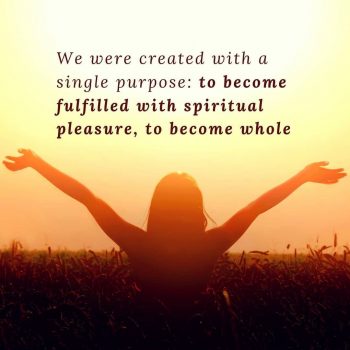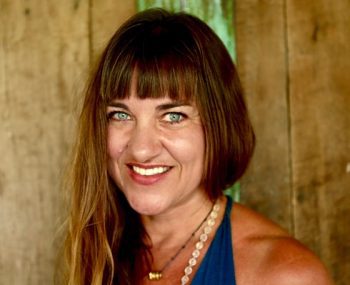By Lissa Rankin
Guest writer for Wake Up World
I have mastered pain as a spiritual path. Throw conflict, trauma, and drama at me and I can alchemize it into spiritual gold. Sic a pit bull on me and I’ll milk it for all it’s worth, finding the fierce grace in every ounce of agony. Put me in the midst of people with life-threatening or chronic illness and I can help facilitate others through the most brutal physical challenges, supporting patients as they alchemize adversity into awakening. But pleasure as a spiritual path? I am in freakin’ kindergarten, people.
I realized this toward the end of 2017, after I endured three years of back-to-back traumas during the third Perfect Storm of my life. (They seem to come 12 years apart. I’m praying to sail through 12 years from now!) Trauma — I am a master. I have so many tools for moving through my victim story quickly, without spiritual bypassing, so I can efficiently transmute the most devastating losses and betrayals into soul lessons.
But then I met Olivier, the man I will marry on the Summer Solstice in an oceanfront wedding. And all of the sudden, the upper limit of my pleasure tolerance was right in my face. Wow! What if the benevolent Universe is conspiring to shower me with blessings, but I’m blocking the blessings because of my masochism pattern? Jeez. This was a huge wake-up call, to see this pattern in myself. (Note to self: Be gentle.)
Am I a Masochist?
As I was reflecting on the past few years of my life, I realized that I had a sort of twisted preference for pain over pleasure. I came by this masochism pattern honestly. As the child of a father who was a self-sacrificing doctor and a codependent mother with a Savior complex, I was also influenced by a family full of missionaries, my Christian upbringing, and then 12 years of medical education that all repeat the same message — “Good people give until they’re depleted.” This often meant that my family gave away money they needed, brought in traumatized orphans who harmed the other children in our family, gave blood until they were anemic, worked until they were exhausted, and generally neglected self care until everyone was sick. Because that’s what good people do, right?
I’ve spent years in therapy and working with spiritual teachers to interrupt this pattern, and I’ve quit giving until I’m depleted, but I didn’t realize that the unconscious preference of pain over pleasure was still running my system. It’s not that I like pain! I hate it, frankly. It’s just that pain has become my comfort zone. It’s what I’ve normalized, and my high pain threshold has made me capable of functioning at a high level even in the midst of intense emotional, physical, or psychic pain.
Not until I got bombarded with pleasure did I realize how truly handicapped I am when it comes to receiving immeasurable blessings. I have to laugh at myself! How is it possible that I can handle so much pain, but throw a really loving, affectionate, gorgeous man at me who isn’t taking advantage of me or causing drama, who loves my tribe and treats me like a goddess, and all my stuff shows up! Sheesh … we humans are adorable.
Life is Great. Can I Handle Greatness?
After three years of unexpected trauma, 2018 has been full of unexpected blessings — a book deal I didn’t anticipate with Sounds True for my new book The Daily Flame: 365 Love Letters From Your Inner Pilot Light, calling in my beloved and meeting him only days after my ceremonial new moon invitation, experiencing one awe-inspiring synchronicity after another, feeling the sweetness of healing and soul-deepening with “brutiful” ex-lovers and the twin flame I still care about, and having those ex-lovers accepted, welcomed, and even celebrated by my fiancée. I’ve had beautiful career opportunities open up. My tribe is growing closer together. I inherited money I didn’t anticipate from the heart-wrenching loss of my mother, which helped me pay off debt incurred by the last few years of trauma, and my mother has been visiting me often — in unmistakable ways — from the other side of the veil, confirming what I suspected but hadn’t had confirmed in such obvious ways before.
So life is beautiful and enlivening and ecstatic and full of awe, wonder, and mystery. And yet some part of me is having a really hard time handling all this goodness.
Am I Hitting My Upper Limit?
My fiancée suggested I read Gay Hendricks The Big Leap, about how to spot and overcome upper limit issues. According to Hendricks:
“I have a limited tolerance for feeling good. When I hit my Upper Limit, I manufacture thoughts that make me feel bad. The problem is bigger than just my internal feelings, though: I seem to have a limited tolerance for my life going well in general. When I hit my Upper Limit, I do something that stops my positive forward trajectory. I get into a conflict with my ex-wife, get into a money bind, or do something else that brings me back down within the bounds of my limited tolerance.”
Whoa …
Why do we do this? Hendricks goes on.
“Our species in general had grown accustomed to pain and adversity through millennia of struggle. We knew how to feel bad. WE had millions of nerve connections devoted to registering pain, and we had a huge expanse of territory in the center of our bodies dedicated to fear. Certainly we had pleasure points in various places, too, but where were the mechanisms for ongoing, natural good feeling? I realized we were only recently evolving the ability to let ourselves feel good and have things go well for any significant period of time.”
What if Pleasure is a Spiritual Path Too?
Traditional religions have a long history of martyrdom and masochism built into them. Everything from self-flagellation to poverty vows to sleeping on beds of nails to hours of sitting meditation in the lotus position to celibacy have been promoted as ways to get closer to God. But some of the more esoteric branches of the major wisdom traditions offer an enticing alternative. What if pleasure can actually deepen your connection to Source even more?
In the past month, I spent one weekend with Taoist sexuality and Tantra teacher Saida Desilets and I was blessed to read the galley of her new book Desire, which I wrote the foreword for. (Stay tuned for this book. It’s not for sale yet.) Then this past weekend, I studied with Tantra lineage holder Michaela Boehm, who also gave me a galley of her new book The Wild Woman’s Way, which I inhaled in a few hours and just endorsed.
After I interviewed Saida this month for our ongoing Soul Tribe community, one of our Soul Tribe members said, “Desire is God’s way of sparking our creativity.” I love this! Yes. What if every act of pleasure is actually a way of celebrating Divine play?
Hedonism and Pleasure as a Spiritual Path are Not the Same Thing
I’ve often been turned off by unabashed hedonism. When pleasure comes at the expense of considerate caring about other people, justifies greed and gluttony, indulges behaviors that harm your health or the health of someone else, or is used as a rationalization for the uncontrolled materialism that is sweeping our planet, I turn away. I’ve met some self-proclaimed pleasure divas who call themselves Tantrikas but turn into entitled little children having tantrums, demanding that life be pleasurable in all ways, when life’s inevitably unpleasurable moments hit. Without caring who gets struck in the lashing out of their wrath, they insist on getting their way and have a fit if they don’t get it. That’s not what I’m talking about here. That’s just narcissism dressing up in “pleasure as a spiritual path” drag. But then . . . that’s not pleasurable for me. So I guess that wouldn’t be my version of pleasure as a spiritual path!
So I guess it’s a paradox. What is truly pleasurable, at the deepest core of my being, given that it gives me pleasure to live in alignment with what serves Mother Earth, my fellow humans, my feminine nature, my family and friends, my health, and my own sensual enjoyment of a turned-on life? That is my exploration right now. I’ll be diving in, taking notes, and sharing what I learn with you all, so stay tuned and make sure you’re on my mailing list — since I’m less and less enamored of Facebook and Twitter — if you’re curious to explore. (You can sign up for the newsletter here.)
I’m beginning by working with teachers in the spiritual lineages that do not separate the sacred from the Divine, such as indigenous spirituality, Taoism, and Kashmir Shaivism, one of the Hindu Tantra lineages. In these traditions, everything is believed to be sacred — not just God/Goddess, but also the body, sexuality, “inanimate” objects in nature, and even death.
My New Practices of Pleasure as a Spiritual Path
How am I navigating this for myself? First, I’m engaging my regular practice of spiritual surrender, surrendering this desire to expand my edges of tolerance for pleasure to the Divine — and asking for help for the Divine Beloved. Next, I’m literally making it a practice to tolerate as much yum as I possibly can. My inspiration for this kind of practice is my friend Ania, who I like to call the “Yum Goddess.” As I wrote in this blog post 15 Gifts For Your Pleasure Toolbox, Ania is masterful as maximizing the yum factor out of any experience.
“Ania knows how to make anything juicy. When most people go to an event, they show up, sit in a folded chair, and listen to the presenter. Ania shows up with a sheepskin rug, a jug of fresh squeezed watermelon juice, an aromatherapy spritzer, some raw chocolate, and two pillows. You can just see everyone else at the event wishing they had bothered to make the experience as yummy as Ania does. When her adorable, Goddess-worshipping husband asks her how she could feel even more yummy, she’ll coo at him in the most sexy, delicious, sincere, loving way, “Ooooh … my love … I would get so turned on if you made me some of that raw cacao cashew milk hot chocolate with maple syrup.” And he is delighted to please her in this way. I mean … yum.”
So I’m now practicing ramping up the yum factor with Olivier. He’s from the South of France, where “yum” is part of his culture and where there’s less puritanical programming than we have here in the United States. So he’s way more comfortable with effusive yum than I am. We’re enjoying ecstatic moments out in nature, listening to the CD he recorded of his heart-opening violin music, lying with our hearts pressed together, breathing in sync until our hearts are practically bursting with yum. This is my kind of spiritual practice!
Yet we’re both bumping up against our upper limits. There’s so much bubbling yum in our lives right now — beauty in nature, farm-to-table food we’re harvesting ourselves, loving tribe that is embracing our union, intimate connection with my daughter, soothing music, ecstatic dance, purposeful work, devoted service, and soulful love-making. It’s so yummy that I notice my contractions, stemming from my old programming that, in a weird way, feels more comfortable with pain than pleasure. I notice my mind keeping score, worried about being indebted to those who are offering me pleasurable experiences. It’s SO much more comfortable for me to give than receive, yet I’m committed to finding more balancing between my giving and receiving, reminding myself that the in breath is just as necessary as the out breath when you’re breathing.
So how am I handling all this pleasure? Just as I handle too much pain with breath, as if I’m in labor, using the breath to tolerate the pain, I am using the breath to expand my capacity for pleasure. Each time I notice a contraction, I breathe. I’m digesting the pleasure with gratitude practice, drinking in every moment, savoring every sensation and naming it out loud so I don’t bypass it, allowing myself to take it all the way in. I can feel the expansion, and as paradoxically uncomfortable as it feels, I know I am growing here.
I sense that this is all part of expanding my repertoire of human experience. Perhaps, if there is an ideal state, it’s that we don’t have a preference for either pain or pleasure, that whatever comes, comes, and we roll with both equally. Since I’m now aware that I’m more comfortable with pain than pleasure, I’m practicing a kind of pleasure affirmative action, even allowing myself to swing too far to the pleasure side, just so I can practice expanding my capacity. I suspect the pendulum will settle out, allowing me greater fluidity of tolerance for both life’s inevitable pains and the great joys of being alive in a human body.
Just as I have used the mantra “Thank you for this gift of love” to help me handle agonizing crises, I am now using the same to expand my capacity for pleasure. Thank you for this gift of love. Thank you for this gift of love. Thank you for this gift of love. (You can listen to Karen Drucker’s musical rendition of this mantra here.)
I’m aware of what psychologists call “hedonistic adaptation,” which essentially means that even if life is really really pleasurable, we adapt to even the most ecstatic routines, and they fail to make us happy after a certain amount of time. It’s as if we have a set point, and even achieving everything we desire alters our set point, so that we wind up back on the “more, more, more” treadmill, feeding the hungry ghost of the ego but never really savoring life’s pleasurable experiences.
So to ward this off, I’m also making impermanence an awareness practice. This beautiful sentiment by Jeff Foster has become my guiding light.
“You will lose everything. Your money, your power, your fame, your success, perhaps even your memories. Your looks will go. Loved ones will die. Your body will fall apart. Everything that seems permanent is impermanent and will be smashed. Experience will gradually, or not so gradually, strip away everything that it can strip away. Waking up means facing this reality with open eyes and no longer turning away.
“But right now, we stand on sacred and holy ground, for that which will be lost has not yet been lost, and realizing this is the key to unspeakable joy. Whoever or whatever is in your life right now has not yet been taken away from you. This may sound trivial, obvious, like nothing, but really it is the key to everything, the why and how and wherefore of existence. Impermanence has already rendered everything and everyone around you so deeply holy and significant and worthy of your heartbreaking gratitude. Loss has already transfigured your life into an altar.”
I wrote this out and put it on my altar, and every day, I begin my day by reminding myself that everything I have not lost yet can lead to unspeakable joy. If I can dare to actually lean into the vulnerability of this, I sense that pleasure can lead me into uncharted waters, expanding the edges of my tolerance without causing me to grasp for what I desire or lean away from what I don’t want. What if pleasure and pain can fluidly come and go, just like emotions that move through like clouds? How much pleasure can I let in without blocking or sabotaging it because it hits against some upper limit programmed by my childhood and career choices? If the Universe is conspiring to shower me with unlimited blessings, can I let myself fully receive, savor, appreciate, and bow humbly in gratitude with my “Yes, thank you?”
What About You?
Do you have a preference for pain over pleasure? Or are you a yum goddess, well versed in pleasure as a spiritual path? Do you feel inspired to embark upon a journey of pleasure as a spiritual path? Share your thoughts here, please.
Yum yum yum,
Recommended articles by Lissa Rankin:
- The Unmistakable Link Between Unhealed Trauma and Physical Illness
- Satisfying Our Emotional Needs Without Being Codependent
- Relationships on the Spiritual Path
- How to Make Your Body Ripe for Miracles
- Are You “Spiritual But Not Religious?”
- 10 Fun Ways to Reduce Your Cortisol Levels
- 6 Stories To Make You Believe In The Power Of The Mind To Heal You
- 7 Tips For Finding Your Tribe
- Holding Space When Someone Is In Pain
- 10 Surprising Things That Trigger “Fight-Or-Flight”
About the authors:
Lissa Rankin, MD is a mind-body medicine physician on a grass roots mission to heal healthcare, while empowering you to heal yourself. She is the founder of the Whole Health Medicine Institute training program for physicians and healthcare providers, and the New York Times bestselling author of the books Mind Over Medicine: Scientific Proof That You Can Heal Yourself (2013), The Fear Cure (2014), and The Anatomy of a Calling (2015).
Lissa blogs at LissaRankin.com and created the online community HealHealthCareNow.com. She is also the author of several other books, a speaker, a professional artist, an amateur ski bum, and an avid hiker. She lives in the San Francisco Bay area.
Connect with Lissa on Facebook and Twitter, or visit LissaRankin.com.

If you've ever found value in our articles, we'd greatly appreciate your support by purchasing Mindful Meditation Techniques for Kids - A Practical Guide for Adults to Empower Kids with the Gift of Inner Peace and Resilience for Life.
In the spirit of mindfulness, we encourage you to choose the paperback version. Delve into its pages away from screen glare and notifications, allowing yourself to fully immerse in the transformative practices within. The physical book enriches the learning process and serves as a tangible commitment to mindfulness, easily shared among family and friends.
Over the past few years, Wake Up World has faced significant online censorship, impacting our financial ability to stay online. Instead of soliciting donations, we're exploring win-win solutions with our readers to remain financially viable. Moving into book publishing, we hope to secure ongoing funds to continue our mission. With over 8,500 articles published in the past 13 years, we are committed to keeping our content free and accessible to everyone, without resorting to a paywall.










